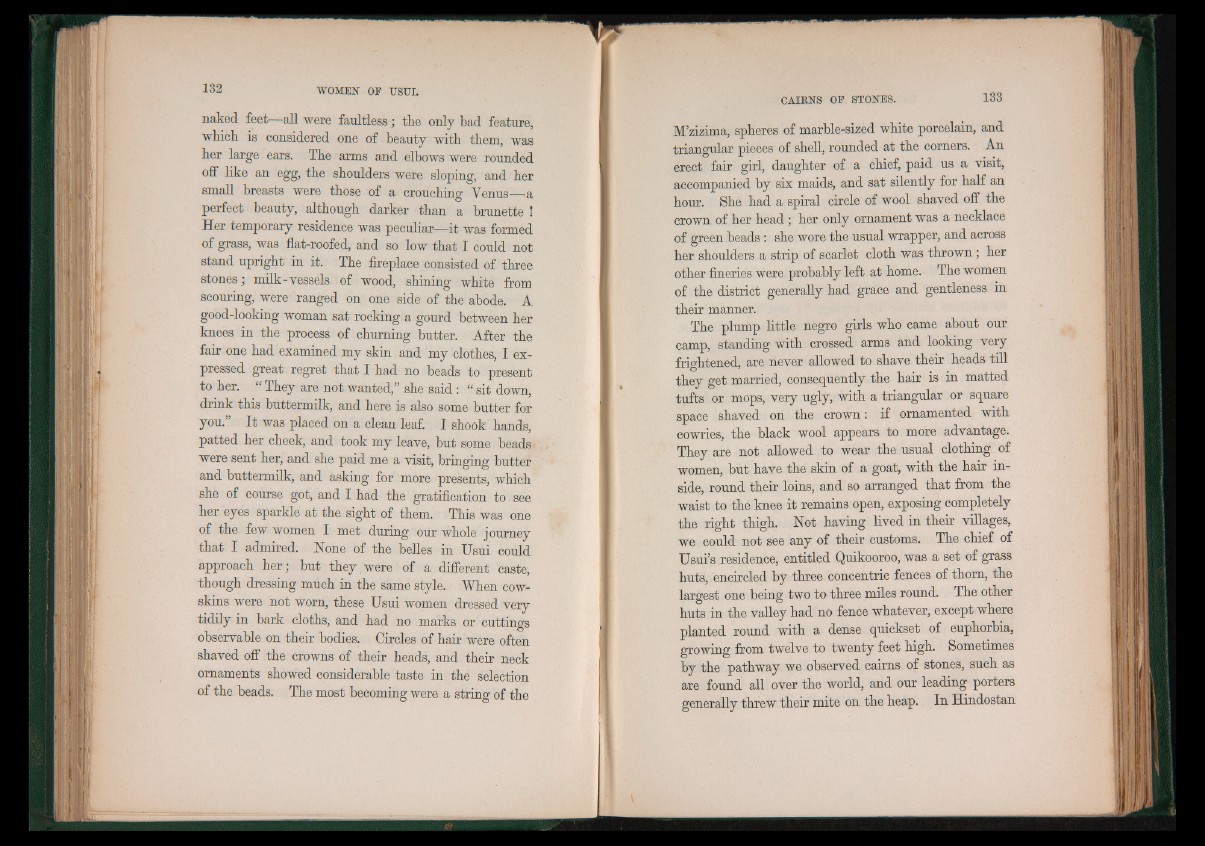
naked feet—all were faultless; the only bad feature,
whicb is considered one of beauty with, them, was
ber large ears. The arms and elbows were rounded
off like an egg, tbe shoulders were sloping, and her
small breasts were those of a crouching Yenus—a
perfect beauty, although darker than a brunette !
Her temporary residence was peculiar—it was formed
of grass, was flat-roofed, and so low that I could not
stand upright in it. The fireplace consisted of three
stones; milk-vessels of wood, shining white from
scouring, were ranged on one side of the abode. A
good-looking woman sat rocking a gourd between her
knees in the process of churning butter. After the
fair one had examined my skin and my clothes, I expressed
great regret that I had no beads to present
to her. They are not wanted,” she said : “ sit down,
drink this buttermilk, and here is also some butter for
you. I t was placed on a clean leaf. I shook hands,
patted her cheek, and took my leave, but some beads
were sent her, and she paid me a visit, bringing butter
and buttermilk, and asking for more presents, which
she of course got, and I had the gratification to see
her eyes sparkle at the sight of them. This was one
of the few women I met during our whole journey
that I admired. None of the belles in Usui could
approach her; but they were of a different caste,
though dressing much in the same style. When cow-
skins were not worn, these Usui women dressed very
tidily in bark cloths, and had no marks or cuttings
observable on their bodies. Circles of hair were often
shaved off the crowns of their heads, and their neck
ornaments showed considerable taste in the selection
of the beads. The most becoming were a string of the
M’zizima, spheres of marble-sized white porcelain, and
triangular pieces of shell, rounded at the corners. An
erect fair girl, daughter of a chief, paid us a visit,
accompanied by six maids, and sat silently for half an
hour. She had a spiral circle of wool shaved off the
crown of her head; her only ornament was a necklace
of green beads : she wore the usual wrapper, and across
her shoulders a strip of scarlet cloth was thrown; her
other fineries were probably left at home. The women
of the district generally had grace and gentleness in
their manner.
The plump little negro girls who came about our
camp, standing with crossed arms and looking very
frightened, are never allowed to shave their heads till
they get married, consequently the hair is in matted
tufts or mops, very ugly, with a triangular or square
space shaved on the crown: if ornamented with
cowries, the black wool appears to more advantage.
They are not allowed to wear the usual clothing of
women, but have the skin of a goat, with the hair inside,
round their loins, and so arranged that from the
waist to the knee it remains open, exposing completely
the right thigh. Not having lived in their villages,
we could not see any of their customs. The chief of
Usui’s residence, entitled Quikooroo, was a set of grass
huts, encircled by three concentric fences of thorn, the
largest one being two to three miles round. The other
huts in the valley had no fence whatever, except where
planted round with a dense quickset of euphorbia,
growing from twelve to twenty feet high. Sometimes
by the pathway we observed cairns of stones, such as
are found all over the world, and our leading porters
generally threw their mite on the heap. In Hindostan